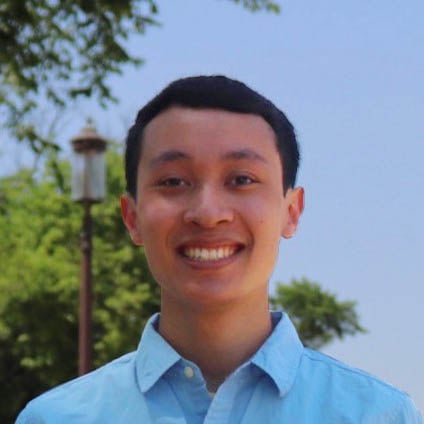Major: Astrophysics
Research Advisor: Olivier Doré and Henry Gebhardt, NASA Jet Propulsion Laboratory
Astrophysics and Math major Brandon Khek works to understand the structure of the universe in his research with Olivier Doré and Henry Gebhardt at the NASA Jet Propulsion Laboratory.
“This research falls into the area of cosmology, and a main goal of cosmology is to understand the origin, evolution, and fate of the universe,” Brandon explained. In the next few decades, NASA plans to launch multiple new space-based telescopes. These telescopes will measure the positions of hundreds of millions of galaxies, and the goal of Brandon’s research is to make the most out of this data. “By measuring the positions of all these galaxies, we can essentially make a sort of three-dimensional map of the distribution of matter around us. And so the way this matter is distributed is related to the composition of the universe and its shape and how it evolves,” he said.
He continued, “In astrophysics or cosmology, to analyze this distribution of matter we can use a statistic called the power spectrum, and the power spectrum basically just describes the typical length scales on which matter — like galaxies — clusters.” Normally, the power spectrum is based on the Cartesian geometry we’re familiar with from basic mathematics, which is based on a rectangular grid. However, as a telescope peers out into the universe as far as it can see in all directions, it maps out a spherical region, and its observations have an inherently spherical geometry. Brandon seeks to construct a version of the power spectrum that accounts for this spherical geometry to maximize the amount of information scientists can glean from these surveys and to predict how well observations from galaxy surveys will reduce the uncertainty in our estimates of important parameters describing the universe.
Previously, Brandon worked with Andrew Long in the Rice Department of Physics and Astronomy investigating how it might be possible to observe a hypothetical particle called an axion, one of the candidates physicists think might make up dark matter. While he found his research here at Rice fascinating, he is glad he branched out to study new topics with another organization. “I think that doing research off-campus has allowed me to extend my network, and I think it gave a bit of a broader perspective of astrophysics,” he shared.
Outside of his research, Brandon is passionate about sharing space and physics with others. For example, in Fall 2021, he designed and taught a course on exploring the mathematics behind popular physics topics like black holes. The course was designed for anyone with an interest in physics, and students came from a wide range of majors. Last fall, he also gave a TEDxRice talk on how cosmology impacts our daily lives. As part of the Society for the Exploration and Development of Space (SEDS) at Rice, he helped plan the 2021 SpaceVision networking conference for students and young professionals in the space industry, which was held at the NASA Space Center Houston.
“I enjoy physics because it’s striking to me the way we can understand phenomena at the most fundamental level of the universe. It’s also humbling the way some things in physics contradict reality as we know it,” Brandon said. He hopes to continue studying and sharing this subject by first earning a PhD in physics or astrophysics and later pursuing a professorship.

